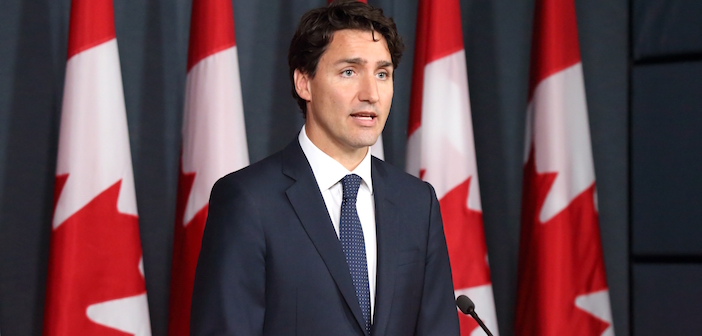Marijuana Legalization Bill Passes on the Senate
This Thursday, the Senate approved in principle the federal government’s bill for the legalization of recreational marijuana.
This is one of Prime Minister Trudeau’s most popular election promises with the bill passed after a few days full of tension.
The vote was 44 to 29 and the next step will be waiting for five different Senate committees to go over the bill and give their recommendations.
This will not be the last step as an upper house final debate is needed and also a final vote; this is expected to happen by June 7.
Prime Minister Justin Trudeau asked the senators to pass the bill, saying that if it didn’t happen, illegal use of cannabis will continue without any benefits of federal regulations.
“It does not protect our young people, and it sends billions per year to organized crime and street gangs. We need a new system,” he said.
On the other side, conservative Senators condemned the legalization of the recreational use of cannabis in the country. Their argument is based on the belief that this law may endanger youth, increasing the smoking rates and make the work of police officers harder than already is.
“It’s a piece of shit. It doesn’t protect people; it will not exclude organized crime from the production. So, most senators say this bill was written badly,” Conservative Senator Pierre-Hugues Boisvenu told reporters.
However, Prime Minister Trudeau warns to the senators that they should respect the opinion of Canadians that chose a government which platform included the legalization of cannabis.
Liberals were afraid the bill would not survive the second reading; the prospect of a loss triggered a concern of a double embarrassment for the government, not only because of the bill not passing but what that would mean as a response to the efforts of a more independent and less partisan chamber.
Usually, approval in principle or second reading vote is not as complicated and it is just a quick vote to allow the bill to be sent to committee, but this time was different. Conservative senators voted as a bloc against bill C-45 and they intend to continue opposing the bill until the last decision.
Although Conservatives don’t dominate the upper house, they were expecting more than a couple of independent senators to support them on their decision, that plus a large number of absent independents was the conservatives’ strategy to defeat the bill.
The strategy did not go as planned thanks to the independent senators’ leadership. All of the independents absent members were asked to return to Ottawa before the vote.
Independents knew they would be blamed if the bill was defeated. A big majority of the independents made it back in time and voted as a bloc together with the unaffiliated and Liberal independent Senators.
Conservative Senator Don Plett predicted that even after what happened, the independents will support amendments to the bill and maybe even vote against it at the end. He also said that the Conservatives were “the most independent caucus”, although they all voted as a bloc too.
The leader of de independent senators’ group, Sen. Yuen Pau Woo, thinks that “it’s not extraordinary at all” that the independents could vote for the bill to be sent thorough scrutiny of the committees, it is just their constitutional duty to analyze and make sure everything is correct. He also said that is not a sure thing that they will necessarily support the bill until the end.
Conservative Senate leader Sen. Larry Smith said to the press that if the bill was defeated it would be because the reforms done by Trudeau cannot rely on senators appointed by the prime minister to give their support to government legislation and not because of partisan games played by conservatives. Smith insisted that it did not have anything to do with partisanship but instead, it has everything to do with Sen. Harder as the government representative. He believes that Prime Minister Trudeau’s new system has holes in it.
Smith expressed his and the conservative senators’ five main concerns about the Cannabis bill: First concern is the impact that it could have on young people, indigenous people, public security, the lack of police officers prepared to enforce a regime where pot is legal, including the absence of a way to test for drug-impaired driving, and, last but not least, the absence of public education and campaign to prepared parents and people in general to understand the bill.
He warned about young people being affected by second-hand smoking in homes where adults smoke or grow pot legally.
He also talked about the government ignoring the Canadian Medical Association’s recommendation of setting the legal age for cannabis consumption to 25, instead, the government opted for 18 years old.
Peter Harder, Senator and government’s representative in the Senate, acknowledged that the bill has still many issues to be dealt with. For the other part Sen. Boisvenu even referred to the bill as a “piece of s***”, he ended up apologizing for such harsh words.
Trudeau expects the Senate to scrutinize the bill and suggest necessary improvements, but he also keeps reminding them that Canadians already voted and want him to end the prohibition of cannabis.
The criminalization of cannabis is not protecting anyone, especially kids, he says.
Canada is on the list of developed countries with the highest under-age consumers of marijuana, the Prime Minister expressed. He also remarks that on the contrary, the criminalization of cannabis just keeps filling the organized crime pockets with money, getting up to $7 billion every year.
“The current system does not work”, said Trudeau.
The bills have been before the Senate since November 2017, now it will be sent to the Senate Social Affairs, Science and Technology Committee, plus also getting supplementary scrutiny from four more committees: The legal and constitutional affairs committee, the National Security and Defense Committee, the Foreign affairs and International Trade Committee and the Aboriginal Peoples Committee.
The country now waits for the bill to go through the additional readings before hopefully being put into effect later this year, legalizing marijuana in Canada once and for all.

